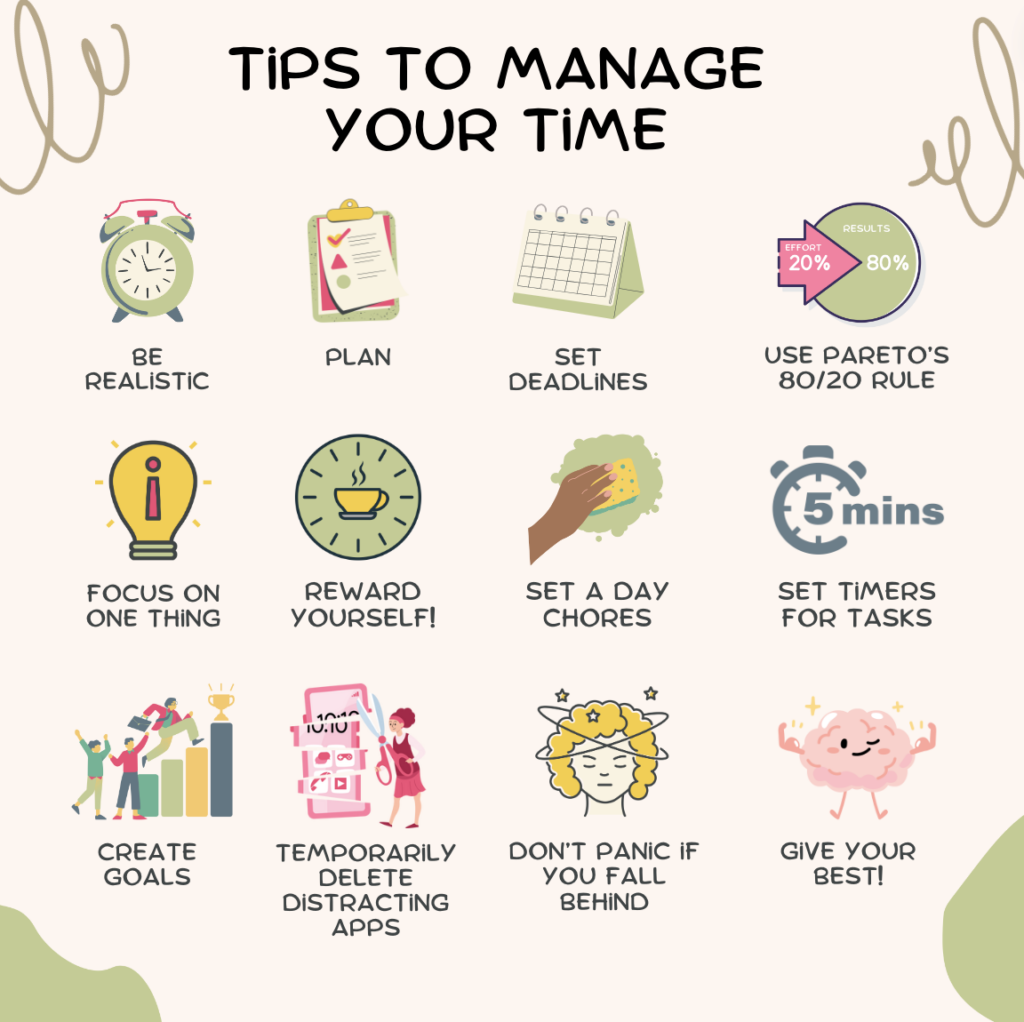Time management is crucial at university. If you are looking to balance your social and academic life while finding time to relax and have fun, then this is the right place for you. As you start learning to become more independent at university, it may be challenging to come up with a routine that fulfils every aspect optimally.
Student Testimonial
Below is a conversation with Ivy, a third-year student, regarding time management at university and useful tips that first year students could benefit from.
Example Schedule
As students become accustomed to following a set routine at school, it becomes challenging to devise and stick to a routine without any supervision at university. We have therefore come up with a schedule detailing a week that resembles a first year student’s schedule. However, this schedule is just an example and we advise you to adapt this according to your learning and lifestyle habits.
| Monday | Tuesday | Wednesday | Thursday | Friday | Saturday | Sunday | |
| 9 AM – 12 PM | Lectures | Lectures | Lectures | Lectures | Lectures | Outdoor movement + Breakfast | Outdoor movement + Breakfast |
| 1 PM | Lunch | Lunch | Lunch | Lunch | Lunch | Lunch | Lunch |
| 2 PM | Lab | Notes (Mon) | CSP activities (Sports) / Review notes | Notes | Tutorial | Clean | Review notes / Coursework |
| 3 PM | Lab | Notes (Tue) | – | Notes | Notes | – | Review notes / Coursework |
| 4 PM | Lab | Horizons | Coursework | Coursework | Notes | – | Socialise |
| 5 PM | Go home / Exercise | Horizons | Coursework | Coursework | Coursework | – | – |
| 6 PM | Rest | Math Assignment | Rest / Exercise | Rest / Exercise | Coursework | Socialise | – |
| 7 PM | Cook dinner | Socialise / Dinner | Cook dinner | Dinner | Socialise / Dinner | Dinner | Cook dinner |
Here are some top tips from us for managing your time at university!

- Be realisitc – Understand your limits.
- Plan – your month, week, day (see below!)
- Set deadlines – to stay on-track and avoid last-min rushes!
- Pareto’s Rule – focus on the 20% of tasks that will produce 80% of the results.
- Focus on 1 thing – studies show that multitasking reduces productivity, efficiency and quality of work.
- Reward yourself – you don’t always have to be productive, take breaks.
- Chores – e.g., make every Saturday 2-5pm your day for chores, laundry, groceries.
- Set timers – even for simple tasks e.g., set a 7 minute countdown to tidy up your room! (a little bit of pressure if you’re really procrastinating).
- Create goals – this is what keeps you motivated. Practice setting 3 short-term & long-term SMART goals every term.
- Temporarily delete social media apps/games – then re-download when you’re done with your task or revision.
- Don’t Panic! – falling behind is the norm at uni – everyone is, even if they don’t show it.
- Give your best – the best you can do is TRY. You’ll see improvement and success over time.
For more tips and advice, visit this link!
Additional Resources & Apps
Planners
One Note or Notion – a great way to section tasks and to-do lists
Trello or Microsoft Planner – for prioritising tasks and tracking progress
Asana – managing workflow, daily life and more!
Google Docs Templates – there are hundreds of free planner templates you can use and edit!
Timers
Pomodoro – you’ve probably already heard of this very efficient study technique?
Nesto – the perfect timer with a selection of background sounds & music
Forest – stay focused and plant trees!
Lofi Aesthetic Timer – similar to Nesto
Countdown Clock – add a countdown to motivate you to complete tasks!
Other tools to help you
Alarmy – try this when it becomes a struggle for you to wake up and go to lectures!
Website blockers – spending too much time on YouTube? Try these extensions to block distractions
Habit trackers – check out these apps to start building healthy habits!
Atomic Habits – a classic must-read